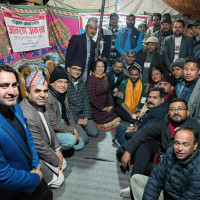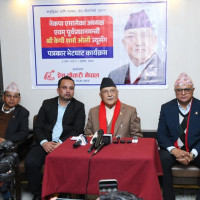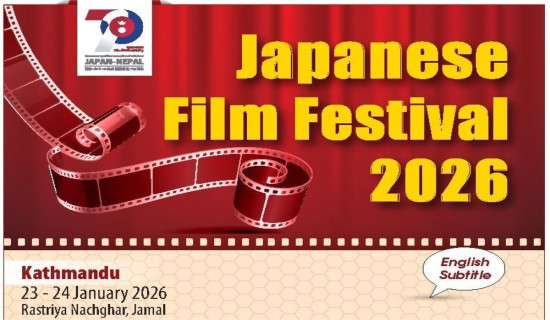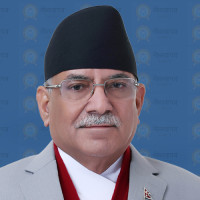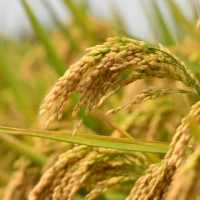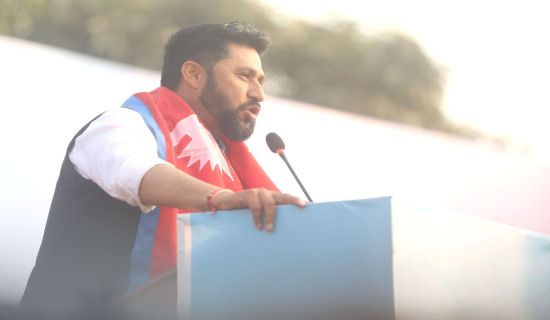- Tuesday, 20 January 2026
Democracy Day Special
Legacy Of National Democracy Day
Before we discuss the significance of National Democracy Day, it will be pertinent to look back on the past when Nepal was ruled by the Rana oligarchy for more than a century. It was a period of utter exploitation and suppression as people were deprived of their fundamental human rights, such as civil, political, and economic rights. They had no right to form assemblies, associations, or groups to discuss problems among themselves, let alone organise a political party that serves as a bridge between the people and the government. Despite such a suffocating atmosphere in which the spies hired by the Rana rulers were always on the lookout for enemies of the regime, some freedom-loving people had no choice but to organise themselves, albeit secretly, and mobilise fellow citizens opposed to the regime.
The formation of Praja Parisad, led by Tanka Prasad Acharya and his likeminded colleagues, to launch a movement against family rule for democracy was an event of historic significance. Other brave souls like Shukraraj Sastri, Dharma Bhakta, Dasarath Chand, and Ganga Lal, who wanted to usher in democracy by overthrowing the Rana regime, were arrested and brutally hanged and killed.
People pay homage every year to these martyrs and others who sacrificed their lives for a noble cause. While people like BP Koirala, Ganeshman Singh, Tanka Prasad Acharya, and Dilliraman Regmi were frontline leaders, King Tribhuvan also supported the democracy movement, and his contribution was no less significant.
Even poets and writers who expressed their discontent with the regime in their literary works became victims of the autocratic rulers’ fury. Kavi Siromani Lekhnath Poudyal’s famous poem ‘Parrot in a Cage’ was an expression of the poet’s sarcasm against lack of individual freedom, including freedom of expression, as the Rana rulers expected the people to become docile, submissive, and parrot-like sycophants. The poet somehow was able to avoid a prison sentence for this composition. But Yugakavi Siddhicharan Shrestha, who used the expression ‘Kranti’ or revolution in his poem for the first time and thus became the revolutionary poet, was charged with inciting the people to rise in rebellion against the regime and was arrested. His property was confiscated, and he was sentenced to prison for 18 years.
Senior politician Ganesh Man Singh, who spent some years in prison and came under the influence of Yugakavi Shrestha, makes this poignant observation in his memoir about his jail experience: Siddhicharan Dai played an important role in shaping my life and career. I was on the verge of getting mentally deranged, but he saved me and became a source of my inspiration. His poetry inspired me to become a virulent critic of the despotic and oppressive Rana regime. This is how I joined politics and became active in overthrowing the autocratic regime.
The 104-year-old Rana rule came to an end with the advent of democracy in BS 2007 through the joint efforts of the king and the people. As a result of the compromise accord reached in New Delhi, the coalition government was formed and headed by Mohan Shumsher, the Rana prime minister, while BP Koirala from Nepali Congress assumed the post of Home Minister. Though this government did not last long, Nepal inaugurated a new era of democratic rule. The co-existence of Ranas and people's representatives in the same coalition was inconceivable just a few months ago. The country, however, was faced with numerous challenges, like a lack of a modern administrative setup and poor infrastructure. Transition from the old regime to a new system based on respect for democratic norms and human rights is not a smooth affair in any country which has passed through a major political change. The new government in Nepal adopted an interim constitution to help the government run the administration, build necessary infrastructure, and promote economic growth and development. Connecting one part of the country with another part was an uphill task. Indian currency was still legal in the Terai region, and it had to be replaced with Nepali currency.
One heartening development was a phenomenal rise in the number of schools across the country. There was a growing realisation of the need to open as many schools as possible for training new skills and producing educated manpower. Nepal opened up for the first time to the outside world. In 1955, three major events of historic significance took place. The country participated in the Afro-Asian Bandung Conference in April, also attended by a large number of newly independent countries from Asia and Africa.
The same year, in August, diplomatic relations with the People’s Republic of China were established, and four months later, in December, Nepal was formally admitted to the United Nations. Nepal has since then continued to raise its voice not only for the cause of least developed and landlocked developing countries but also for other issues of global concern such as peace, development, and disarmament. UN membership has enabled Nepal to adopt and pursue an independent foreign policy based on principles enshrined in the UN Charter, Pancha Sheel, and nonalignment after Nepal became a founding member of the Movement for Nonalignment in 1961.
During the last seven decades and a half following the declaration of Fagun 7, BS 2007 as the National Democracy Day, the country has witnessed a number of changes on the political front from absolute monarchy to constitutional monarchy under multi-party democracy and further to the Federal Democratic Republic under the new constitution promulgated in 2015. Whatever the political system we adopt, the spirit with which people introduced democracy more than 70 years ago continues to inspire all succeeding generations to nurture democratic culture, embrace new outlooks in keeping with the times, and modernise the country's economy to uplift the living conditions of the people. Democracy is not only a form of political system but also a way of life reflecting our mindset and behaviour pattern. Accountability and transparency are indispensable ingredients of democracy, without which no nation can march ahead on the path of development leading to prosperity.
(Prof. Lohani is a former ambassador.)




